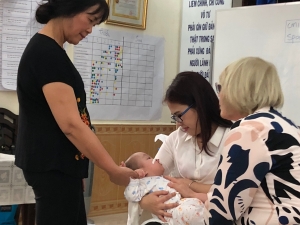
During their first years of life, children develop brain architecture and establish a foundation for life-long health and learning. Malnutrition interrupts this process, and children who experience adversity are at the highest risks of malnutrition. This blog will explore how social service workers are working to prevent malnutrition in vulnerable children; and how capacity building and stronger systems can lead to better development outcomes for all children.
Nutrition, disability, and the right to family care
 Vulnerable children, including those with disabilities and those without family care, face some of the highest risks of malnutrition. Children with disabilities are three times as likely to be malnourished; and SPOON’s work has shown rates of malnutrition as high as 91% in residential care facilities. Around 80% of children with disabilities have feeding difficulties, and specialized feeding support is limited in most low- and middle-income countries.
Vulnerable children, including those with disabilities and those without family care, face some of the highest risks of malnutrition. Children with disabilities are three times as likely to be malnourished; and SPOON’s work has shown rates of malnutrition as high as 91% in residential care facilities. Around 80% of children with disabilities have feeding difficulties, and specialized feeding support is limited in most low- and middle-income countries.
In residential care facilities, staff typically do not receive training on nutrition best practices, and children often miss out on nutrition and nurturing care at critical developmental windows. Globally, the social welfare community is working to develop childcare systems that fulfill every child’s right to family life. A strong foundation of nutrition helps to prepare children for community life and contributes to the success of care reform efforts.
While malnutrition is a significant challenge, it is preventable. SPOON equips social service workers and caregivers to prevent and respond to malnutrition in these highly vulnerable children by linking children and caregivers with the individualized support they need.
Embedding nutrition in the social service system in Vietnam
In Vietnam, child malnutrition is high nationally, with vulnerable children particularly at risk. SPOON, International Social Service, and the government of Vietnam are working together to support social service workers to respond to the nutrition and feeding needs of children with disabilities living in institutions and those living outside of, or returning to, family care.
In Vietnam, SPOON has equipped a team of Master Trainers from the Ministry of Labour, Invalids and Social Affairs with knowledge, skills, and tools in growth monitoring, anemia prevention, and improved feeding practices for children with disabilities. These Master Trainers are training children’s caregivers to improve nutrition and feeding practices by using SPOON’s app, Count Me In, to track children’s growth, detect anemia, and assess feeding practices. Data from Count Me In helps caregivers implement individualized care plans for each child, and improve nutrition and feeding practices across community or residential care sites. Their work is reducing rates of malnutrition and improving children’s health, development, and chances for a successful return to family care.
This program also aims to prepare children with disabilities as they to transition to community settings into family care through supporting the government in building a reintegration pilot. The long-term goal is to equip the social service workforce with knowledge and skills to include the unique feeding and nutrition needs in the case management of children during the reintegration process, and to support families to care for children with disabilities.
Scaling social service workers’ impact in nutrition
With strong training and tools, social service workers can support caregivers and link them with services to prevent malnutrition in vulnerable children. SPOON has seen significant improvements in nutrition outcomes with this approach, with stunting halved across our programs. To make this a reality at scale, social service champions need to ensure that appropriate training and support are in place and that children who need specialized care and treatment are linked with the health system. Nutrition must be included in policies and programs that seek to improve children’s development. With supportive policies, consistent capacity development, and strong systems, social service workers can ensure that all children meet their potential.
By Carolyn Moore and Tammy Teske, SPOON. SPOON is a global nonprofit empowering caregivers to nourish children who are highly vulnerable to malnutrition. Learn more about our work at www.spoonfoundation.org.
